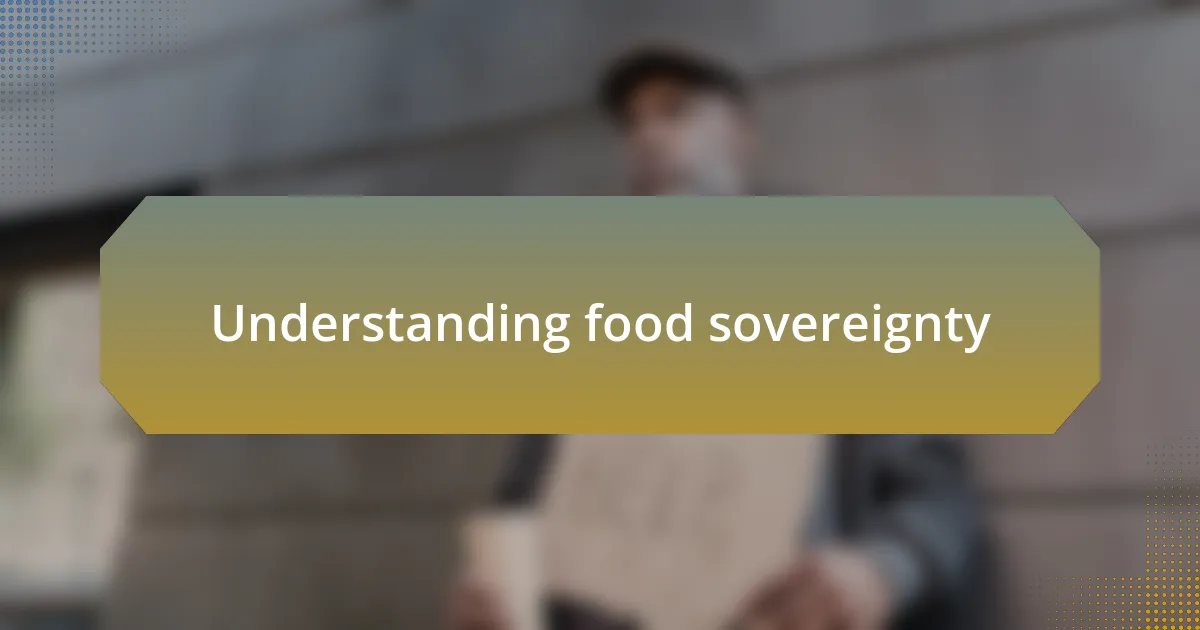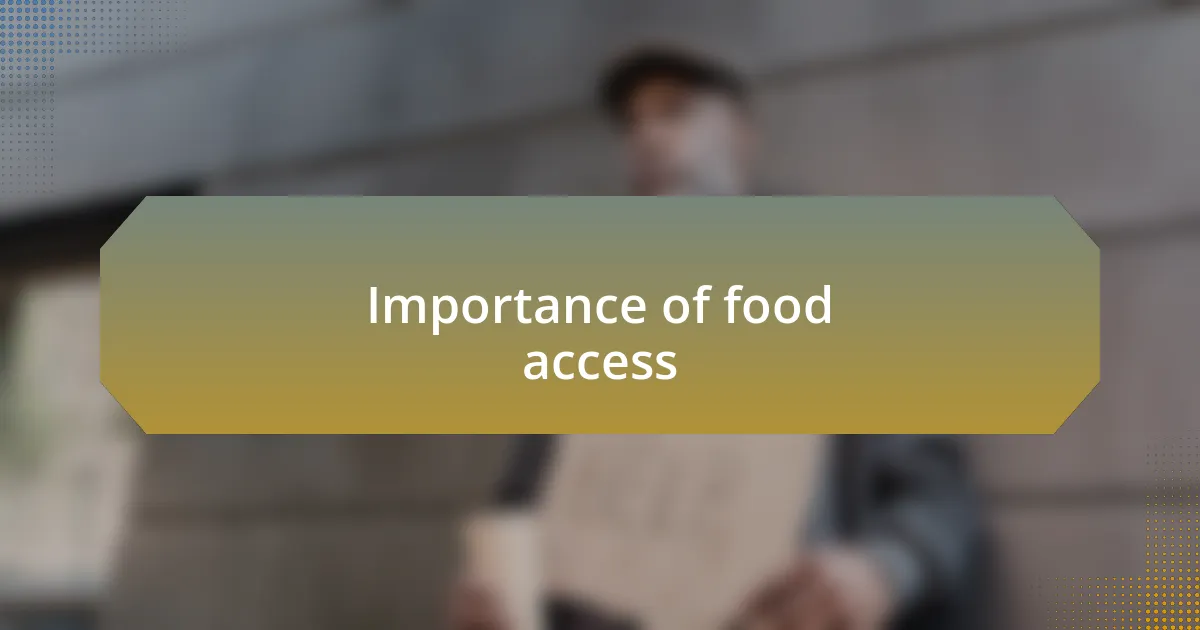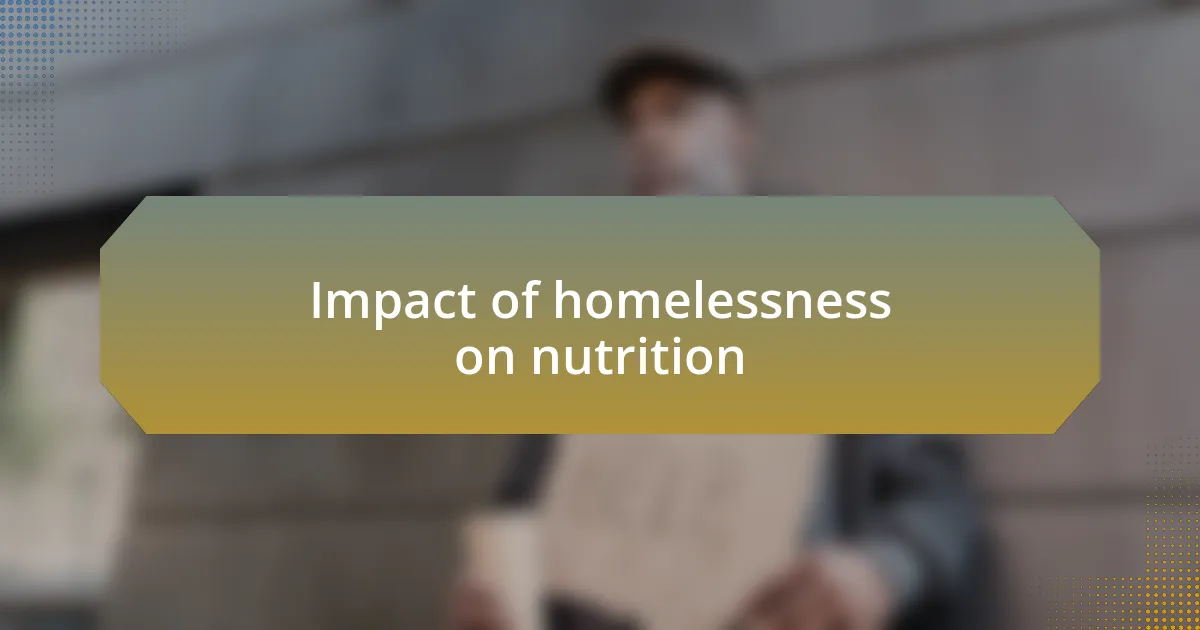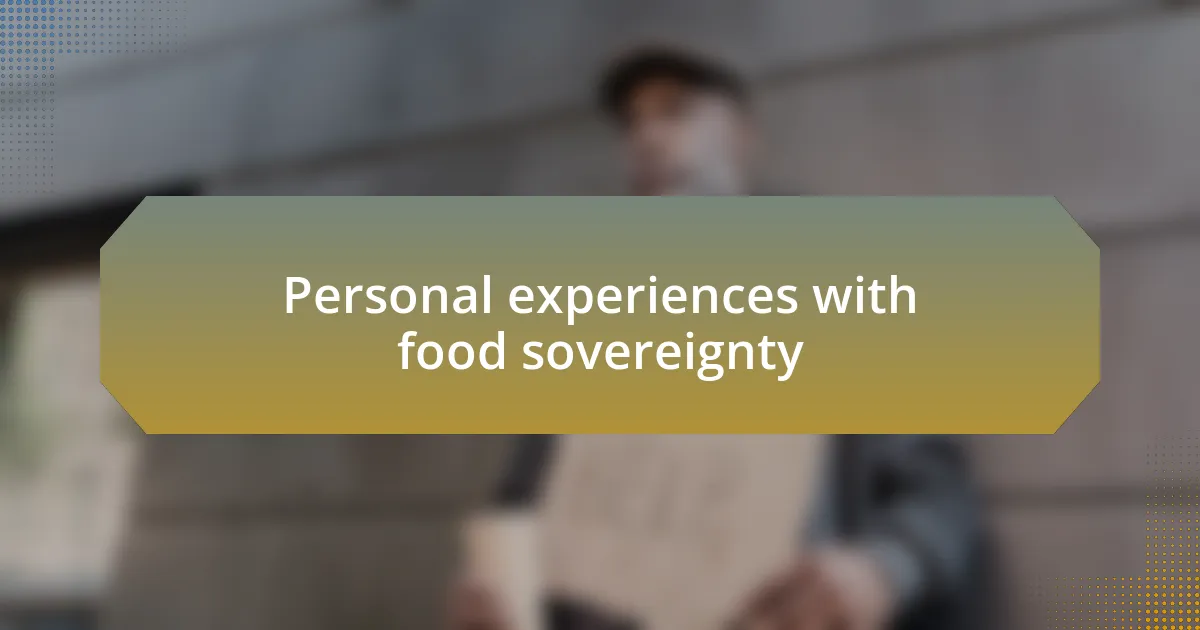Key takeaways:
- Food sovereignty emphasizes the right to define one’s own food systems, prioritizing local culture and control over sustenance.
- Access to food empowers individuals, influencing their health, relationships, and community resilience.
- Homelessness disrupts nutritional choices, often leading to reliance on unhealthy, convenient food options.
- Personal experiences illustrate food sovereignty as a path to empowerment and connection to cultural identity through community initiatives.

Understanding food sovereignty
Food sovereignty is fundamentally about the right of people to define their own food systems, influenced by local conditions and cultural practices. I remember a time when I visited a community garden and witnessed how residents transformed a neglected space into a flourishing hub of fresh produce. It struck me then how food sovereignty isn’t just about growing food—it’s also about regaining control over one’s own sustenance and heritage.
This concept challenges the dominant global food systems that often prioritize profit over people. When I speak with individuals experiencing homelessness, many deeply desire to reconnect with healthy, familiar foods that resonate with their own cultural identities. Isn’t it powerful to consider that food can be not only nourishment but also a way to restore dignity and belonging?
At its core, food sovereignty emphasizes the importance of local knowledge and skills in food production. I often think about the wisdom shared by elders in my community—their stories about traditional growing methods and seasonal eating are treasures that should be celebrated. How often do we undervalue these lessons in an age of convenience, where fast food has become the norm?

Importance of food access
Access to food is not just a matter of filling stomachs; it’s about empowering individuals. I recall a visit to a local food bank, where volunteers not only distributed groceries but also listened to stories of struggle and hope. Each conversation underscored the importance of having reliable access to fresh, nutritious options, as it isn’t merely about survival—it’s about agency and choice in one’s diet.
When people have consistent access to food, they can plan meals, cook with their families, and even share recipes that carry emotional weight. I remember a woman I met at a community kitchen who spoke fondly of the dishes her grandmother used to make. It made me realize that food is more than just fuel; it builds connections and nurtures relationships. Isn’t it essential to think about how these communal aspects of food are often lost for those who lack stable access?
The implications of food access stretch far beyond individual benefits. It affects health, education, and even employment opportunities. I’ve seen how children who participate in after-school programs with proper meals show improved focus and performance. Isn’t it remarkable to think that something as fundamental as food can influence a child’s future? Access to food isn’t just important; it’s a cornerstone for building more resilient communities.

Impact of homelessness on nutrition
Homelessness drastically alters one’s relationship with food, often forcing individuals to prioritize immediate survival over nutritional needs. I vividly recall speaking with a man who told me how he scavenged for meals, often resorting to fast food because it was cheap and accessible, despite his knowledge that it wasn’t healthy. Isn’t it troubling to consider how desperation can lead people to make choices that compromise their long-term health?
Limited access to kitchens and cooking facilities further compounds the challenges faced by those experiencing homelessness. I once volunteered at a shelter where guests had to rely on pre-made meals. One woman shared her frustration, missing the comfort of cooking for her children. The lack of control over what she ate affected not only her physical health but also her emotional well-being. How do you think it feels to lose that nurturing aspect of food?
The consequences of poor nutrition can be extensive, affecting mental health and physical resilience. Individuals in precarious living situations often experience higher rates of chronic conditions like diabetes and heart disease. I spoke with a former homeless individual who emphasized that a nutritious meal could feel like a luxury rather than a necessity. Isn’t it essential for us to recognize that nutrition should be a right, not a privilege?

Personal experiences with food sovereignty
Reflecting on food sovereignty, I remember a conversation with a woman living in a tent community. She told me about her efforts to grow vegetables in limited space and how those tiny plants gave her a sense of ownership over her food. It struck me as incredible that, even in her challenging situation, she found a way to reclaim a bit of her autonomy through cultivating her own produce. Can you imagine how empowering that must feel?
One evening while helping at a community garden initiative, I saw people come together not just to plant seeds but to share stories about their cultural backgrounds and food traditions. It was heartwarming to witness how food connects us to our roots. When residents shared recipes and memories tied to their favorite dishes, the garden transformed into a space of healing and hope. Isn’t it fascinating how food can serve as a bridge, linking us to our identities while reinforcing community bonds?
Through these experiences, I’ve come to understand that food sovereignty isn’t just about access; it’s really about empowerment. A friend once shared that receiving food from a pantry felt disempowering until he learned to advocate for better options that reflected his dietary needs. That journey of advocating for what he deserved taught him not only about food but also about his value as a person. How often do we overlook the connection between the food we eat and our self-worth?